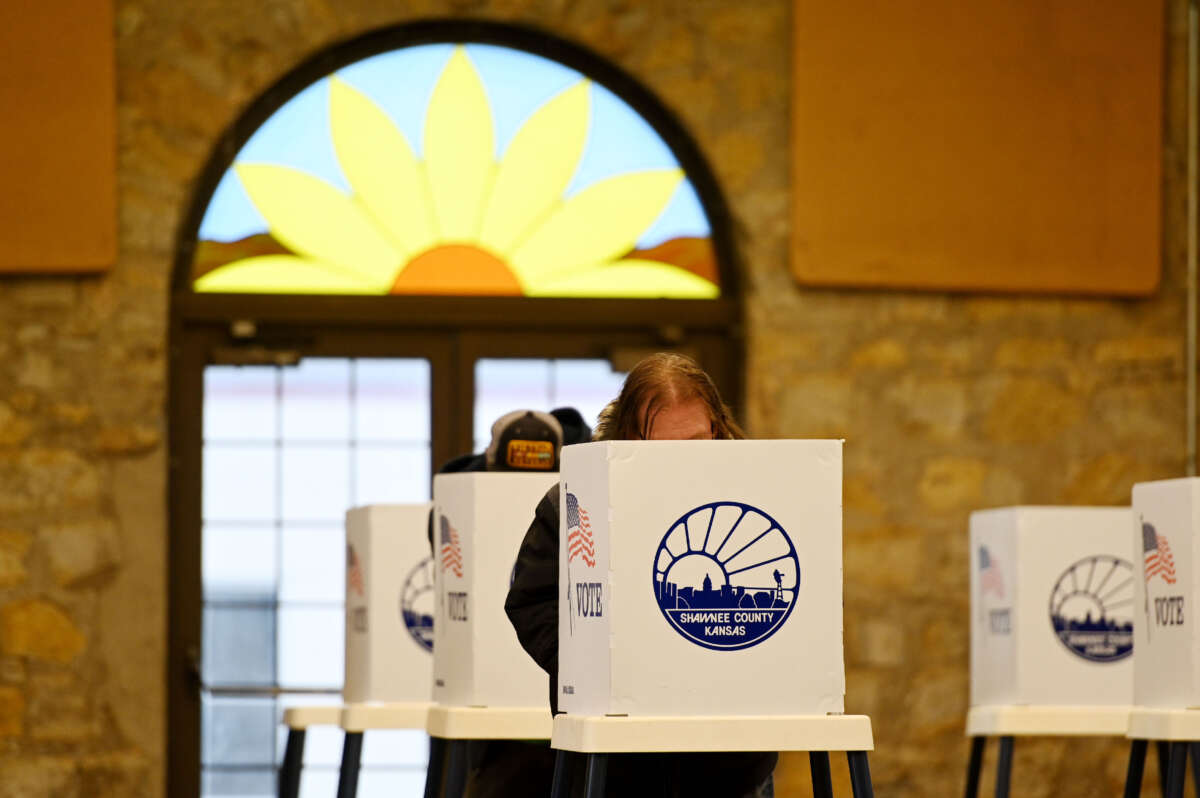Truthout is an indispensable resource for activists, movement leaders and workers everywhere. Please make this work possible with a quick donation.
Transgender Kansans will be able to vote in the upcoming 2023 general election this month, despite trans voters’ initial fears that their IDs would be rejected amid ongoing legal challenges to an anti-trans state law that defines a person’s gender as the sex they were assigned at birth.
Last month, in response to concerns that transgender Kansans may be turned away from the ballot box by election officials, the American Civil Liberties Union sent a letter to local election officials. “We write to provide information necessary to ensure that no transgender Kansans are improperly turned away from the poll,” the ACLU said in the letter. “The gender marker on a voter’s identification document (or lack thereof) should have no impact on their ability to vote in Kansas.”
Senate Bill 180, a sweeping anti-trans bill that took effect July 1, has created mass confusion over how it should be implemented, with state Gov. Laura Kelly (D) and Attorney General Kris Kobach publicly disagreeing over its interpretation. Kobach said in a press conference that the law requires that the state revert birth certificates and driver’s licenses back to the sex assigned at birth for all state residents. Kelly’s administration said that it would continue to allow transgender Kansans to change their markers, in defiance of Kobach’s interpretation of the law.
Kelly had previously vetoed the bill, but her veto was overridden by the legislature.
“It’s a sign of the times. We see so much at the state level by entities, national organizations, whatever, that have an agenda that they systematically push through state legislatures,” Kelly said in April. “By stripping away rights from Kansans and opening the state up to expensive and unnecessary lawsuits, these bills would hurt our ability to continue breaking economic records and landing new business deals.”
In July, Kobach sued Kelly’s administration, quickly securing a temporary restraining order and enjoining Kelly’s administration from hanging gender markers on driver’s licenses for transgender people. Under the current judicial order, the Kansas Department of Revenue cannot issue new IDs that reclassify gender and cannot process applications from transgender Kansans who want to change the gender marker on their IDs. A hearing on a motion for temporary injunction is scheduled for January. .
The ACLU of Kansas, representing five transgender Kansans who want to get or keep a driver’s license that matches their gender identity, has intervened in this lawsuit. “Mr. Kobach’s actions demonstrate a flagrant attempt to do an end-run around our state constitution,” said Sharon Brett, legal director of the ACLU of Kansas.
Transgender voters face many obstacles when voting, such as harassment and discrimination , having their IDs challenged at the poll, and even being turned away because their gender expression or name differs from the ID presented to poll workers. Because of these challenges, many transgender people choose not to subject themselves to potential harm and stay home.
“Most of the cases of any kind of voter suppression aren’t ever going to be known,” Mara Keisling, founder of the National Center for Transgender Equality, told CNN in 2020. “We’ve had very few cases of trans people coming forward saying, ‘I was denied the right to vote.’ But we’ve heard from people who’ve said they shouldn’t vote because they fear they’ll be disrespected or turned away.”
Since 2019, after a federal order mandated that Kansas grant transgender people the ability to change their gender markers on critical documents, more than 1,300 Kansas residents have changed the gender marker on their birth certificate or driver’s licenses. Because of the legal confusion around Senate Bill 180, transgender advocates are concerned that poll workers may decide to turn away transgender voters, or that some voters may feel that it is unsafe to vote.
Despite these concerns, Kelly said last Tuesday that she hopes transgender people will be able to vote with state-issued IDs. “I would hope so, and I don’t see any reason why they wouldn’t.”
A terrifying moment. We appeal for your support.
In the last weeks, we have witnessed an authoritarian assault on communities in Minnesota and across the nation.
The need for truthful, grassroots reporting is urgent at this cataclysmic historical moment. Yet, Trump-aligned billionaires and other allies have taken over many legacy media outlets — the culmination of a decades-long campaign to place control of the narrative into the hands of the political right.
We refuse to let Trump’s blatant propaganda machine go unchecked. Untethered to corporate ownership or advertisers, Truthout remains fearless in our reporting and our determination to use journalism as a tool for justice.
But we need your help just to fund our basic expenses. Over 80 percent of Truthout’s funding comes from small individual donations from our community of readers, and over a third of our total budget is supported by recurring monthly donors.
Truthout has launched a fundraiser, and we have a goal to add 182 new monthly donors in the next 24 hours. Whether you can make a small monthly donation or a larger one-time gift, Truthout only works with your support.
